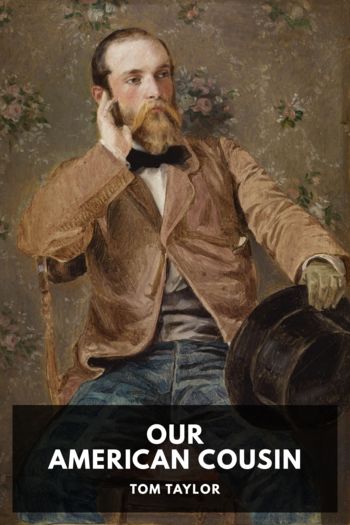Struggles and Triumphs, P. T. Barnum [good books to read in english .txt] 📗

- Author: P. T. Barnum
Book online «Struggles and Triumphs, P. T. Barnum [good books to read in english .txt] 📗». Author P. T. Barnum
In the following summer, 1827, I was taken down with the smallpox and was confined to the house for several months. This sickness made a sad inroad upon my means. When I was sufficiently recovered, I started for home to recruit, taking passage on board a sloop for Norwalk, but the remaining passengers were so frightened at the appearance of my face, which still bore the marks of the disease, that I was obliged to go ashore again, which I did, stopping at Holt’s, in Fulton Street, going to Norwalk by steamboat next morning, and arriving at Bethel in the afternoon.
During my convalescence at my mother’s house, I visited my old friends and neighbors and had the opportunity to slightly renew my acquaintance with the attractive tailoress, “Chairy” Hallett. A month afterwards, I returned to Brooklyn, where I gave Mr. Taylor notice of my desire to leave his employment; and I then opened a porterhouse on my own account. In a few months I sold out to good advantage and accepted a favorable offer to engage as clerk in a similar establishment, kept by Mr. David Thorp, 29 Peck Slip, New York. It was a great resort for Danbury and Bethel comb makers and hatters and I thus had frequent opportunities of seeing and hearing from my fellow-townsmen. I lived in Mr. Thorp’s family and was kindly treated. I was often permitted to visit the theater with friends who came to New York, and, as I had considerable taste for the drama, I soon became, in my own opinion, a discriminating critic—nor did I fail to exhibit my powers to my Connecticut friends who accompanied me to the play. Let me gratefully add that my habits were not bad. Though I sold liquors to others, I do not think I ever drank a pint of liquor, wine, or cordials before I was twenty-two years of age. I always had a Bible, which I frequently read, and I attended church regularly. These habits, so far as they go, are in the right direction, and I am thankful today that they characterized my early youth. However worthy or unworthy may have been my later years, I know that I owe much of the better part of my nature to my youthful regard for Sunday and its institutions—a regard, I trust, still strong in my character.
In February, 1828, I returned to Bethel and opened a retail fruit and confectionery store in a part of my grandfather’s carriage-house, which was situated on the main street, and which was offered to me rent free if I would return to my native village and establish some sort of business. This beginning of business on my own account was an eventful era in my life. My total capital was one hundred and twenty dollars, fifty of which I had expended in fitting up the store, and the remaining seventy dollars purchased my stock in trade. I had arranged with fruit dealers whom I knew in New York, to receive my orders, and I decided to open my establishment on the first Monday in May—our “general training” day.
It was a “red letter” day for me. The village was crowded with people from the surrounding region and the novelty of my little shop attracted attention. Long before noon I was obliged to call in one of my old schoolmates to assist in waiting upon my numerous customers and when I closed at night I had the satisfaction of reckoning up sixty-three dollars as my day’s receipts. Nor, although I had received the entire cost of my goods, less seven dollars, did the stock seem seriously diminished; showing that my profits had been large. I need not say how much gratified I was with the result of this first day’s experiment. The store was a fixed fact. I went to New York and expended all my money in a stock of fancy goods, such as pocketbooks, combs, beads, rings, pocketknives, and a few toys. These, with fruit, nuts, etc., made the business good through the summer, and in the fall I added stewed oysters to the inducements.
My grandfather, who was much interested in my success, advised me to take an agency for the sale of lottery tickets, on commission. In those days, the lottery was not deemed objectionable on the score of morality. Very worthy people invested in such schemes without a thought of evil, and then, as now, churches even got up lotteries, with this difference—that then they were called lotteries, and now they go under some other name. While I am very glad that an improved public sentiment denounces the lottery in general as an illegitimate means of getting money, and while I do not see how anyone, especially in or near a New England State, can engage in a lottery without feeling a reproach which no pecuniary return can compensate; yet I cannot now accuse myself for having been lured into a business which was then sanctioned by good Christian people, who now join with me in reprobating enterprises they once encouraged. But as public sentiment was forty years ago, I obtained an agency to sell lottery tickets on a commission of ten percent, and this business, in connection with my little store, made my profits quite satisfactory.
I used to have some curious customers. On one occasion a young man called on me and selected a pocketbook which pleased him, asking me to give him credit for a few weeks. I told him that if he wanted any article of necessity in my line, I should not object to trust him for a short time, but it struck me that a pocketbook was





Comments (0)